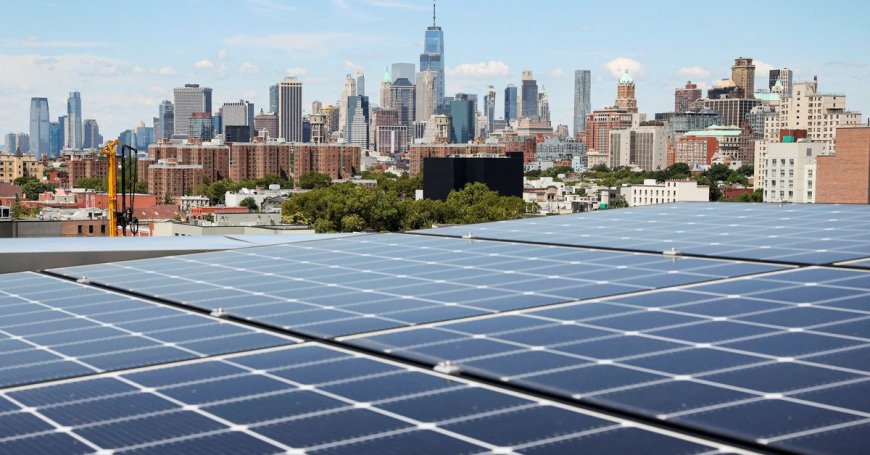Global survey shows two-thirds of population favours solar power
Global survey shows two-thirds of population favours solar power Reuters

Global Survey Shows Strong Public Support for Solar Energy
/cloudfront-us-east-2.images.arcpublishing.com/reuters/YPUBOLGB7RNYNOE67XXOUJ6XNA.jpg)
AMSTERDAM, Sept 15 (Reuters) – A global poll conducted by Glocalities in collaboration with advocacy groups Global Citizen and The Fossil Fuel Non-Proliferation Treaty Initiative has found that more than two-thirds of the world’s population favors solar energy, which is five times higher than public support for fossil fuels.
The survey, based on interviews with more than 21,000 people in 21 countries between January and June, included countries such as Australia, Brazil, China, India, Italy, Mexico, South Africa, South Korea, Turkey, and the United States.
Solar Power: The Most Popular Energy Source
According to the survey, solar power received the highest support with 68% of respondents favoring it as an energy source. This was followed by wind power (54%), hydropower (35%), and nuclear power (24%). Only 14% of respondents expressed a preference for fossil fuels.
Support for Renewables in Europe and the United States
The Glocalities poll reinforces other surveys that show strong support for renewables in Europe and the United States. The EU’s latest Eurobarometer from May-June found that 85% of Europeans support “investing massively” in renewable energies like wind and solar power. Similarly, a Pew Research Center poll from early 2022 showed that 69% of U.S. adults prioritize developing alternative energy sources over expanding fossil fuel production.
The Production Gap and the Sustainable Development Goals
Despite the strong public support for renewable energy, fossil fuels still account for 77% of global energy consumption in 2022, according to Michael Sheldrick, Co-Founder and Chief Policy, Impact and Government Affairs Officer at Global Citizen. This “production gap” highlights the paradox between public demand for renewables and the prevalence of fossil fuel production.
The Sustainable Development Goals (SDGs) aim to address this gap and promote sustainable energy practices. The strong preference for solar power among people from different demographics and political affiliations indicates a common ground where political agendas can align with the clear demands of citizens.
The Need for Transition to Renewable Energy
Global energy demand continues to rise, and the dominance of fossil fuels remains unchanged despite record growth in renewables. Scientists emphasize the need to cut greenhouse gas emissions by around 43% by 2030 to meet the goals of the Paris Agreement and limit global warming to well below 2°C above pre-industrial levels.
The survey results highlight the urgent need for a transition to renewable energy sources like solar power to achieve sustainable development and combat climate change.
Reporting by Anthony Deutsch and Kate Abnett; editing by Miral Fahmy
SDGs, Targets, and Indicators
1. Which SDGs are addressed or connected to the issues highlighted in the article?
- SDG 7: Affordable and Clean Energy
- SDG 13: Climate Action
The article discusses public support for renewable energy sources like solar power and the need to reduce greenhouse gas emissions. These issues are directly related to SDG 7, which aims to ensure access to affordable, reliable, sustainable, and modern energy for all. Additionally, the article mentions the need to cut greenhouse gas emissions to meet the goals of the Paris Agreement, aligning with SDG 13, which focuses on taking urgent action to combat climate change and its impacts.
2. What specific targets under those SDGs can be identified based on the article’s content?
- SDG 7.2: Increase substantially the share of renewable energy in the global energy mix
- SDG 13.2: Integrate climate change measures into national policies, strategies, and planning
The article highlights the public support for solar power and renewable energy sources, indicating a need to increase their share in the global energy mix. This aligns with SDG 7.2, which aims to increase substantially the share of renewable energy in the global energy mix. Additionally, the mention of the need to cut greenhouse gas emissions and take action to combat climate change reflects the target of integrating climate change measures into national policies, strategies, and planning (SDG 13.2).
3. Are there any indicators mentioned or implied in the article that can be used to measure progress towards the identified targets?
Yes, there are indicators mentioned in the article that can be used to measure progress towards the identified targets. These indicators include:
- Public support for solar power and renewable energy sources
- Percentage of global energy consumption from renewable energy sources
- Reduction in greenhouse gas emissions
The article mentions that more than two-thirds of the world’s population favors solar energy, indicating public support for renewable energy sources. This can be used as an indicator to measure progress towards increasing the share of renewable energy in the global energy mix (SDG 7.2). Additionally, the article highlights the need to cut greenhouse gas emissions, which can be measured to track progress towards integrating climate change measures into national policies (SDG 13.2).
SDGs, Targets, and Indicators
| SDGs | Targets | Indicators |
|---|---|---|
| SDG 7: Affordable and Clean Energy | Increase substantially the share of renewable energy in the global energy mix (7.2) | – Public support for solar power and renewable energy sources – Percentage of global energy consumption from renewable energy sources |
| SDG 13: Climate Action | Integrate climate change measures into national policies, strategies, and planning (13.2) | – Reduction in greenhouse gas emissions |
Behold! This splendid article springs forth from the wellspring of knowledge, shaped by a wondrous proprietary AI technology that delved into a vast ocean of data, illuminating the path towards the Sustainable Development Goals. Remember that all rights are reserved by SDG Investors LLC, empowering us to champion progress together.
Source: reuters.com

Join us, as fellow seekers of change, on a transformative journey at https://sdgtalks.ai/welcome, where you can become a member and actively contribute to shaping a brighter future.







